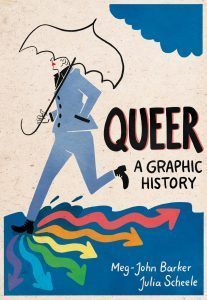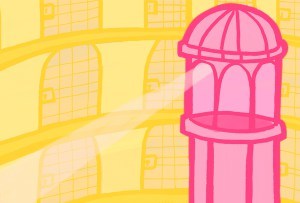Meg-John Barker's Blog, page 19
February 14, 2017
Explore More Summit
I’m so excited to announce that I’m speaking at the Explore More Summit again this year. I had a great time last year and was very pleased to be invited back to chat more about the Enjoy Sex book and many many other things.
[image error]
Explore More is a free online summit that is all about exploring your more: in sex (of all kinds), in your relationships, and in your life.
There are talks on sexual pleasure, body politics, oppression, diet culture, trauma, emotional intelligence, disability, and so so much more.
It all starts March 8th and runs for 10 days, but if you register early you get a free mini workbook full of prompts, questions, and quotes from all of the talks. Also there’s a private Facebook group where you can connect with other attendees and the speakers.
If you fancy it, grab your spot, check out the line up, and tell your friends – exploremoresummit.com
February 10, 2017
Mental health interview
Samantha Harvey recently sent me a great set of interview questions for her project on mental health. She kindly agreed that I could share my answers here as well, so here they are.
What is your understanding of the phrase ‘mental health/wellbeing’?
For me that would be the state where life doesn’t feel like a struggle, where we feel generally able to cope with things that happen, and to treat ourselves relatively kindly. Often ‘mental health’ is seen as in a binary with ‘mental illness’: either we are mentally healthy, or we are mentally ill, and those are seen as relatively fixed states. For me it’s more of a continuum that all of us go up and down over the course of our lives.
What possessed you too create your zine ‘Staying with our Feelings’ and what reactions and feedback did you receive from consumers? (Ps. I love the layout and sketches!)
I’m so glad you liked it! As with most of my work it was inspired by my own struggles, and what I’ve found works for me, and for the people I work with. I was struck that lots of different approaches to mental health include this same idea that it’s useful to stay with our feelings. However, a lot of folks I talk with don’t really know what that means. So I decided to make a simple zine to explain it, and to give some suggestions about some of the different ways of doing it.
The feedback has been really positive! A lot of people say the zine is a lot more accessible to young people, or neurodiverse people, for example, than a book or even a written website. The mix of images and words can make it both more engaging and easier to understand.
Which emotion from your experience and understanding do you feel is becoming most prevalent in modern day society and why?
I would have to go with self-criticism – is that an emotion?! – anyway the whole set of shame type feelings where you feel bad about yourself and like you’re a terrible person, or there’s something wrong with you, or you’re nowhere near as good or worthwhile as everyone else. It’s very linked to the feeling of depression, as well as anxiety that people might ‘find you out’. This is highly prevalent in modern society because consumer culture is based on making us feel bad about things so that we’ll buy products which we’re sold on the basis that they will make us happier, more attractive, more successful, or whatever. Also it’s pretty handy for those in power if we’re all so busy worrying about ourselves that we don’t get politically involved, or act against the cultural messages or structural inequalities that hurt us.
You stated in your Ladybeard article ‘ Depression and Anxiety is a sane response to an insane world’ do you believe these illnesses are a modern day construct and what do you see for the future of our generations in terms of emotion?
I think this is even more clear now than when I wrote that article! With everything that is going on post-Brexit and post-Trump, depression and anxiety could be seen as a pretty sane response. However I would always say that our experiences are ‘biopsychosocial‘. It’s not that social conditions alone ’cause’ mental illness, but rather they weave together in a complex way with our bodies and brains (our biology) and our unique life experiences (our psychology) to result in our own particular patterns when it comes to our mood and how we tend to react to things.
My hope for the future – whether it is realistic or not – is that a key emotional state will be kindness, or compassion, because that’s what we desperately need in order to counter our self-criticism, and the tendency to judge others, or treat them as disposable.
Why do you think emotion and our mental health is such a taboo subject?
We’re taught to feel a lot of shame about mental health difficulties. Also, we’re taught that some emotions and ‘positive’ and others are ‘negative’ and we should really only feel the ‘positive’ ones, otherwise we’re a failure at life. The Pixar movie Inside Out is one of the most profound things I’ve seen about how actually we need all of our emotions in order to have good mental health. Trying to only feel joy, and no sadness, anger or fear, for example, is paradoxically one of the main things that tips us into depression.
I want to understand how we can learn to communicate our feelings more and cope with our mental health better. Therefore, can we use our physical strength to help our mental health. Do you feel there is a correlation between the two, if so, how and why?
Oh absolutely the two are connected. In the West we’ve separated the body and mind for a long time now, but actually they can’t be separated at all. We’re embodied beings. So one of the most helpful things we can do to stay with our feelings is to learn to locate them in our bodily sensations. Similarly, doing things where we feel that great sense of being in our bodies often has a profound impact on our mood. People often feel that when they are moving, listening to music, or being in nature, for example. Again the cultural message that our bodies are something to be ‘perfected’ and ‘beautified’ in order to fit some conventional ideal of what is attractive goes completely against this embodied approach!
From my research I have been focusing on ‘The Emotional Economy’, which discusses how we are feeling more feelings than ever before and trying to find new ways to express ourselves. I feel there is a revolution taking place around normalising mental health outside the medical arena and in the creative space, would you agree?
I think to some extent yes there is much more information and understanding about mental health than there was when I – or my parents – were growing up, for example. But the problem is that we still tend to ‘individualise’ mental health problems – seeing them as something that some people have because of their faulty brains, or faulty thinking – rather than recognising just how tied they are to the wider culture, and to material conditions like poverty, homelessness, and experiencing discrimination, for example.
Furthermore, through what form of creativity (for example art, performance, film) would you say this is most prominent?
Oo hard to say. I’m a big fan of comics, and I think that the large number of mental health web-comics and graphic memoirs has been hugely helpful in capturing diverse experiences of mental health struggles, and normalising them. I worked with Caroline Walters and Joseph de Lappe to make 4 issues of Asylum magazine about this if you’re interested in finding out more.
My big idea is encouraging Generation Y, also known as the IPOD generation (Insecure, Pressurised Over-taxed and Debt-ridden) to go outdoors and do something creative as a means to help express their mental-self more positively. Do you agree and do you see this working?
Absolutely I think both those things are incredibly helpful when it comes mental health – although I’d be wary of advocating them for everyone because different things work for different people, and at different times in their lives.
The IPOD thing is interesting because if those are the key problems (and I think they probably are) then I’d be focused on what we can do to give this generation more security, less pressure, less tax, and less debt. Hence the answer would be political and social reform rather than anything else. So yes get outdoors (on a march) and do something creative (write to your MP, make a placard) 
February 7, 2017
Hell yeah self care
Times are very tough and I’m thinking a lot about how we can be kind to ourselves, and to others, when the wider world is unkind in so many ways. Here’s my first zine on these topics, about why self care is a political act, as Audre Lorde suggests, and how we can go about doing self-care.
Justin Hancock and I will be creating a more ‘make your own’ style zine guide to self-care soon over on megjohnandjustin.com, and I’m hoping to also follow this up with a zine about kindness towards others and what that actually means (but I need some help with that because it is com-pli-cat-ed!)
If you download this pdf and print it out as a booklet it works really well. Also fine to read it online.
January 28, 2017
Survey for readers of Rewriting the Rules (the book)
Later in 2017 I’ll be writing a second edition of my book Rewriting the Rules.
A lot has happened in the world of love, sex, and gender since the book came out in 2013. In the new edition I want to reflect some of those changes and to update all the media references and resources. The publishers, Routledge, and I are also keen that the new version will be cheaper and more user-friendly in format.
Most importantly I’m keen to hear what the readers of Rewriting the Rules think could be done to improve the second edition. This survey is to find out what you liked about the book, what didn’t work so well for you, and what things you’d like to see changed or added.
The new edition will be the same length as the old one to keep it as accessible as possible, but I’m able to change about 10-20% of the material, and I want to make sure those changes are helpful ones. That’s where you come in.
This survey will take approximately 10 to 20 minutes, depending how many suggestions you want to give me. You’ll be asked what you thought about the format of the book, and the overall content, before summarising your feelings on the book and any changes you’d like to see.
It’ll be anonymous so I won’t know who you are, or name you if I quote you. The only thing required is that you’ve read Rewriting the Rules. Feel free to stop at any time if you don’t want to continue.
I can’t promise that all suggestions will make their way into the second edition, but I will certainly do my best to incorporate those which several people agree on. Any that don’t make it into the book may well inform the resources on this website, and I might also write up the survey responses for a brief paper and use some of your comments in the second edition.
Please share this with anybody else you know who has read the book.
Thanks so much for your time.
January 27, 2017
Performance: A new zine (and my first published comic!)
As anybody who reads this regularly will know I’m a huge fan of comics and occasionally manage to make comics of my own.
I’ve managed to include a few small cartoons in some of my books and zines over the years and I’ve been involved in a few great comic-based projects, notably the year of Asylum Magazine which Caroline Walters, Joseph de Lappe and I edited about comics and mental health, and – of course – Queer: A Graphic History, where I provided the words, and Julia Scheele provided the pictures.
Along with her colleagues, Julia also makes great comic anthologies over at One Beat Zines, and they invited me to contribute something to their latest zine on performance. As readers of queer will know, one of the major theories about gender is Judith Butler’s theory of gender performativity, so I did my best to explain that idea, and the implications it might have, in 3 pages! Like many of my comics it’s a personal reflection on my own experiences of gender over the years, asking the question of what it’d be like if we moved away from judging people according to a real/fake binary, towards encouraging everyone to find the gender (experience, identity, expression) that feels comfortable and consensual for them.
[image error]
The anthology includes many beautiful comics around the themes of performance and performativity, many of which relate to gender. Do order a copy if you’re interested.
January 5, 2017
New sex advice book and website!
Happy new year all!
I have an exciting new year announcement. Over the last couple of years I’ve teamed up with BishUK sex educator Justin Hancock to produce a different kind of sex advice. Today sees the launch of our book Enjoy Sex (How, When and If You Want To) and our joint website megjohnandjustin.com which includes all of the sex and relationship advice animations, podcasts and zines that we’ve been working on.
Over the coming months and years, Justin and I will be working together to produce more resources on sex and relationships. We’re particularly keen to answer any questions on our podcast and in our blog posts, so feel free to let us know if there’s anything you’d like us to cover.
I’ll still be posting and sharing resources here at Rewriting the Rules, and I’ll try to flag up here too whenever something new and exciting is happening over at megjohnandjustin.com. Feel free to follow us on facebook and twitter.
December 7, 2016
Gender & Sexual Diversity: A Human Right?
Darren Landgridge and I made this video for The Open University Human Rights Week. Where are we at with the human right to sexual and gender diversity?
November 2, 2016
New video: All about love, sex, gender, Buffy and barbers
I was really flattered recently when James Marcus Tucker and Michael Urwin from Peruvian Tree Productions asked to film me for one of their Inspiring Minds videos about people in the LGBTQ community. They’ve already created three wonderful films featuring Kerry-Anne Mendoza, Peter Tatchell, and Ricky Beadle-Blair.
The idea is that they follow you round for a couple of hours while you take them on a tour of places that are important to you, walking and talking. For my journey I knew exactly where to start: getting my hair cut at the marvellous queer and trans friendly hairdressers Open Barbers. I’m really grateful to Felix for coming in early so that we could begin there. Afterwards I took James and Michael down to London Friend: the LGB&T health and well-being centre where I work as a counsellor once a week. And then we headed down past Kings Cross to the canal where I often walk along to the Open University branch in Camden, to put on events or host meetings.
We talked about lots of topics including therapy, love, gender, sexual and relationship diversity, the need (or not) for labels, kink, and what kind of cake I prefer! You can also see me enthusing about my favourite character from Buffy the Vampire Slayer, trying to explain Buddhist mindfulness in 60 seconds, and talking about the excellent new Open University module ‘Mad or Bad’ that I’m currently involved in producing. A lovely day and a great conversation.
I totally love the video. I’m just a little concerned that I come over like that ‘brilliant’ guy from The Fast Show. But maybe that’s not such a bad thing.

October 31, 2016
What is Queer? Joy 94.9 podcast
I recently did a radio interview with Dean Beck from Australia’s LGBTI radio station Joy 94.9. We talked all about my new book with Julia Scheele – Queer: A Graphic History. We chatted about what queer means, why it’s important, what the current issues are, and where we go next in relation to gender and sexuality.

You can listen to the podcast here.
Mental health beyond binaries: Ladybeard Panel
On 12th November I’ll be speaking on a panel for Ladybeard magazine on mental health. I wrote a piece for their website here about my own thoughts on mental health and the problems with the mad/sane binary.
I’ve experienced mental health struggles for most of my life. For me, like many of us, that means that I’ve had a high level of self-critical background noise a lot of the time: thoughts that I’ve done something terribly wrong, or that I will do, or that there’s something wrong with me. It often manifests as a low, heavy mood: a kind of grey fog over everything that makes it difficult to see things clearly, to make decisions, or to appreciate the beauty of the world around me. At its worst, it has tipped into extreme self-loathing and the urgent wish to eradicate the ‘bad’ parts of me in order to make myself acceptable.
Despite these experiences I’ve always been reluctant to label myself with the terms that might seem obvious when you read this description. I’ve probably ticked the boxes for several of the recognised ‘psychiatric disorders’ in my time, but I don’t feel comfortable identifying as a person with depression, as mentally ill, or as having a psychological problem. Equally I don’t feel comfortable identifying as sane, mentally well, or psychologically healthy. As with so much in life, I feel that the binary – in this case between ‘mad’ and ‘sane’ – is actually part of the problem. Read more….
Meg-John Barker's Blog
- Meg-John Barker's profile
- 333 followers




